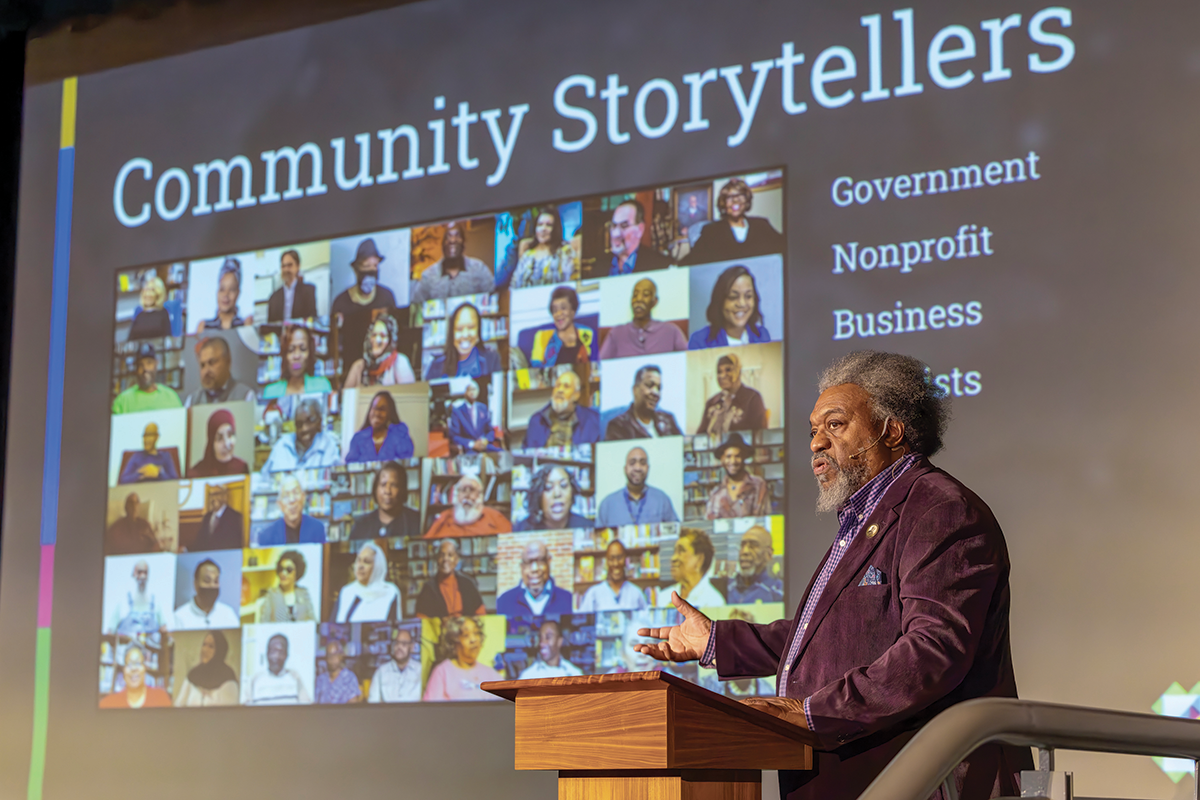Power + Place Collaborative finds strength in preserving community history
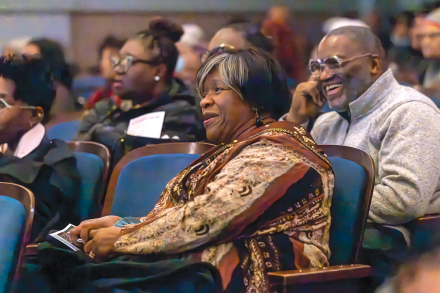
Every community is full of stories — some well-known, some waiting to be told, others on the verge of being lost. The Power + Place Collaborative is bringing those stories to the surface, encouraging Elon University students to step outside the campus bubble and into the Alamance County community.
The initiative, a partnership between Elon’s Center for Design Thinking, the African-American Cultural Arts & History Center, Burlington Recreation and Parks, Alamance County Public Libraries and other community partners and cultural organizations, works to capture and share untold stories of communities in Alamance County.
“So much of the suffering and pain we see in the world is because we don’t know each other, we don’t care about each other,” says Danielle Lake, director of the Center for Design Thinking and associate professor of human service studies. “When we understand our histories from all of these different perspectives, we can re-imagine what we want our community to be together so that it becomes a place where we’re connecting.”
Design thinking is a relational approach to problem-solving that helps uncover the underlying causes of challenges and provides creative, structured methods to address them. It focuses on understanding the needs of the people affected, encouraging collaboration and generating innovative solutions. Since 2016, Elon’s Center for Design Thinking has focused on developing, teaching and studying these techniques.
The idea of collecting oral histories in the community started in 2018 with Jane Sellars, the founding executive director of the African-American Cultural Arts & History Center in Burlington. Sandy Marshall, associate professor of geography, read about Sellars’ work and offered his expertise as a human geographer, studying how young people are shaped by histories of division and violence in their communities.
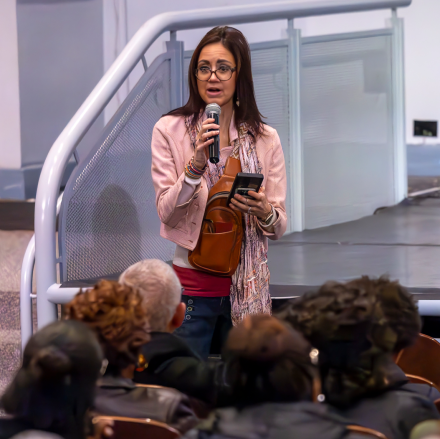
“Although my expertise is in the Middle East, we of course have our own divisions and conflict in our own society, and I wanted to use some of those creative storytelling tools that I’d used with young people in the Middle East and elsewhere here at home,” Marshall says. “I want to have my students see that there are interesting places, interesting stories and diverse perspectives right on their doorstep.”
Sellars and Marshall began working on using digital technology to tell the stories of the Black community in Alamance County. But in summer 2018, some of Sellars’ elders died, intensifying her desire to begin collecting oral histories quickly. So in fall 2018, Marshall launched the Power, Place and Memory course, a precursor to the Power + Place Collaborative. Marshall originally planned to only have his students do audio recordings, but School of Communications students in his class took the effort to the next level with video recordings. Sellars was pleased with the work and was excited to continue, but she died in 2019.
There was a lull in the oral history effort following Sellars’ death, but as interest around community-based learning at Elon grew, Marshall, Lake and Vanessa Drew-Branch, associate professor of human service studies, connected with Alamance County organizations and began to form the Power + Place Collaborative. Drew-Branch came up with the name, inspired by Marshall’s 2018 course.
“[It’s about] learning about the power of our place, but also thinking about how power shapes place and thinking about that critically,” Marshall says.
The Power + Place Collaborative officially kicked off in 2020 amid the COVID-19 pandemic, a tough time for an initiative working to encourage connection and collaboration.
“We did walking tours outside, we used Zoom to record oral histories and we came out of the experience saying ‘We have to continue this. This was incredible,’” Lake says. “At a time when people were feeling isolated and alone, opportunities to connect were even more valued.”
Since its inception, the Power + Place Collaborative has captured about 60 oral histories from a wide variety of people within the Alamance County community, all now available on their website. One of those stories was Bobbi Ruffin, recreation superintendent for the City of Burlington, who helped form the collaborative in 2019. Ruffin’s interest in oral histories began when she was working at the Mayco Bigelow Community Center at North Park in Burlington. The park opened in the 1950s during segregation and was a place where Black families would gather. Ruffin says people would often tell her about their experiences in the park.
“When we understand our histories from all of these different perspectives, we can re-imagine what we want our community to be together so that it becomes a place where we’re connecting.” — Danielle Lake
“After hearing those stories so much, I wanted to really capture them and honor those stories,” Ruffin says. “Of course we didn’t really have Facebook or social media like we have now where folks take pictures all the time. It became a goal of mine to figure out a way we could capture these stories so we could share them.”
Ruffin says being a storyteller didn’t come naturally, as she wasn’t confident that she had much to contribute. “I’m still learning so much, but I think that’s the power in it, because we all have a story, we all have an experience and we all have connections to these spaces and places in our community,” Ruffin says. “Even though it was awkward, I’m really grateful to have the opportunity to share my experience so far.”
James Shields, operations manager for the African-American Cultural Arts & History Center in Burlington, says it’s important to highlight stories that aren’t often told in the news or history books.
“We’re not simply looking for people that are famous or people who have made some great achievements like a political office or business,” Shields says. “We are looking for people who have a compelling story, something that would help people understand citizens of our community that many of us may not interact with in our daily lives.”
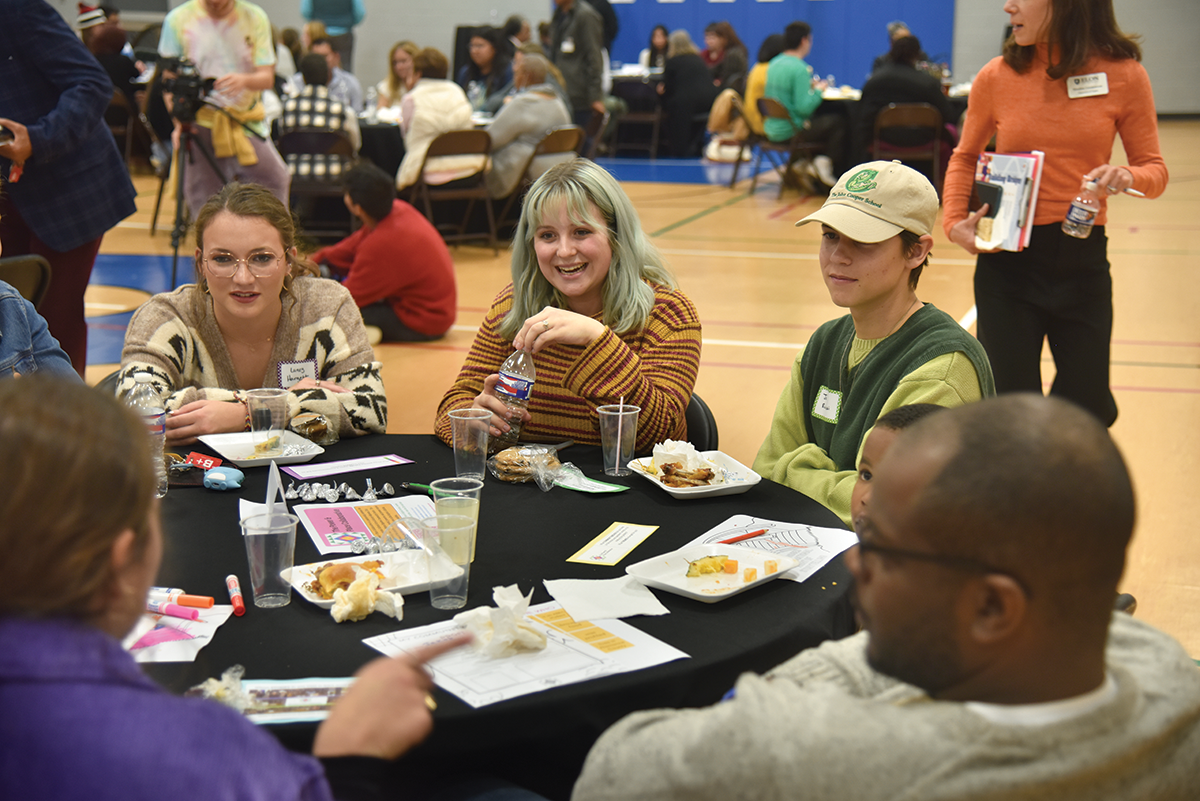
The work of interviewing the storytellers is in the name — collaborative. Each organization contributes in some form to the effort, including Elon students. Aaron Chan ’26, a cinema and television arts major, has worked with the Center for Design Thinking since his first year at Elon. He directed “Legacies of Love,” a documentary highlighting the stories of the Sellars family and their contribution to preserving Black history in Alamance County. Chan’s work won the Center for Writing Excellence’s fall 2024 Campus Involvement Award.
“I want to live here after graduation and I’ve been trying to understand the area as much as possible. I think being at Elon, it’s very easy to stay on campus and be in the bubble. I’ve been very fortunate to meet people who have helped me connect to Alamance County,” Chan says. “It’s a little bit embarrassing if I tell someone I went to school in North Carolina and they ask me what it’s like and I can only think about campus and I don’t know anything about the actual people who live there.”
The work goes beyond video and audio production. Faculty members across disciplines integrate the collaborative into their curricula. In fall 2024, Lecturer in Human Service Studies Deidre Yancey worked with Power + Place to have her students interview storytellers for the Working with Groups and Communities course.
“What I’m focusing on with students is understanding how to identify communities, how to access communities, how to value communities, understanding that communities are made up of different groups of people and each group has their own story,” Yancey says. “Many of our storytellers are much older than our students; they’re the age of their grandparents in many cases, and they develop these friendships. I think they learned a lot from each other, which is another kind of really rich aspect of this project.”
In the Global Migrations course taught by Marshall and Lake, students worked with the CityGate Dream Center community center and the Burlington Masjid to interview people of migrant and refugee backgrounds.
“One of Jane’s early visions was to tell the African American history perspective, but also include other diverse voices in our community, including migrant voices,” Marshall says.
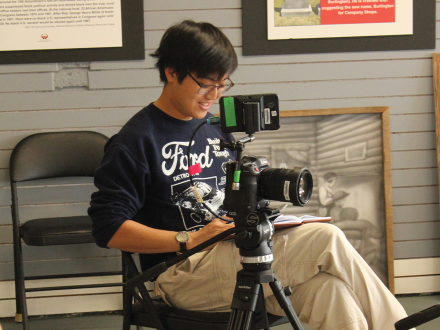
In September 2024, the Global Migrations and Working with Groups and Communities students met with storytellers for an interactive event.
“What is so amazing is that we all have our own unique stories,” says Kassim Mbwana, one of the storytellers at the September event. “It’s so refreshing and empowering to see someone else take their story and retell it in a way that you haven’t thought about and share it with people.”
The event was followed by a December public screening of the students’ stories. Yancey was particularly moved by a storyteller’s experience crossing the U.S.-Mexico border.
“It’s so important for people to hear and understand issues directly from the people that have experienced them, thinking about change-making and the power of stories,” Yancey says. “I’m talking a lot about being a leader within one’s community, and this idea that leadership is about recognizing where there are areas of need in your community and working with others to make positive change.”
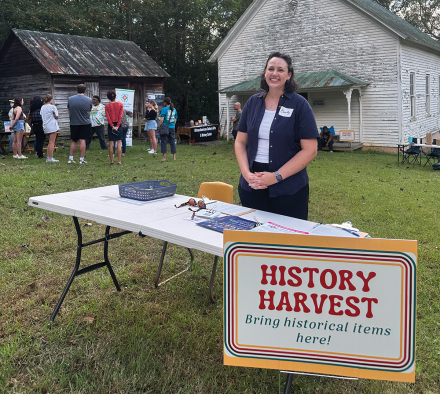
Marshall and Lake also teach the Honors Program course Place and Placemaking, where students conduct “community-based research with the aim of uncovering the hidden histories of forgotten places and reimagining how places in the community might look instead.” Mya Lee ’26, an Honors student studying entrepreneurship, took the course in her second year.
“I was able to take a lot of what I learned and apply it to my personal growth and connect with the people of the community where I live,” Lee says. “It’s important for me to get to know the people of my community and connect further with the people in the community who look and relate to me.”
The course made such an impact on Lee that her Honors thesis focuses on some of the storytellers, specifically how Black entrepreneurs can be supported.
“As an entrepreneurship major, I have a strong passion for small business and small business growth,” Lee says. “As an African American female in the field, I wanted to empower Black entrepreneurs and shine a light on what I like to call hidden histories. A lot of Black entrepreneurs in our history haven’t been highlighted the way I believe they should.”
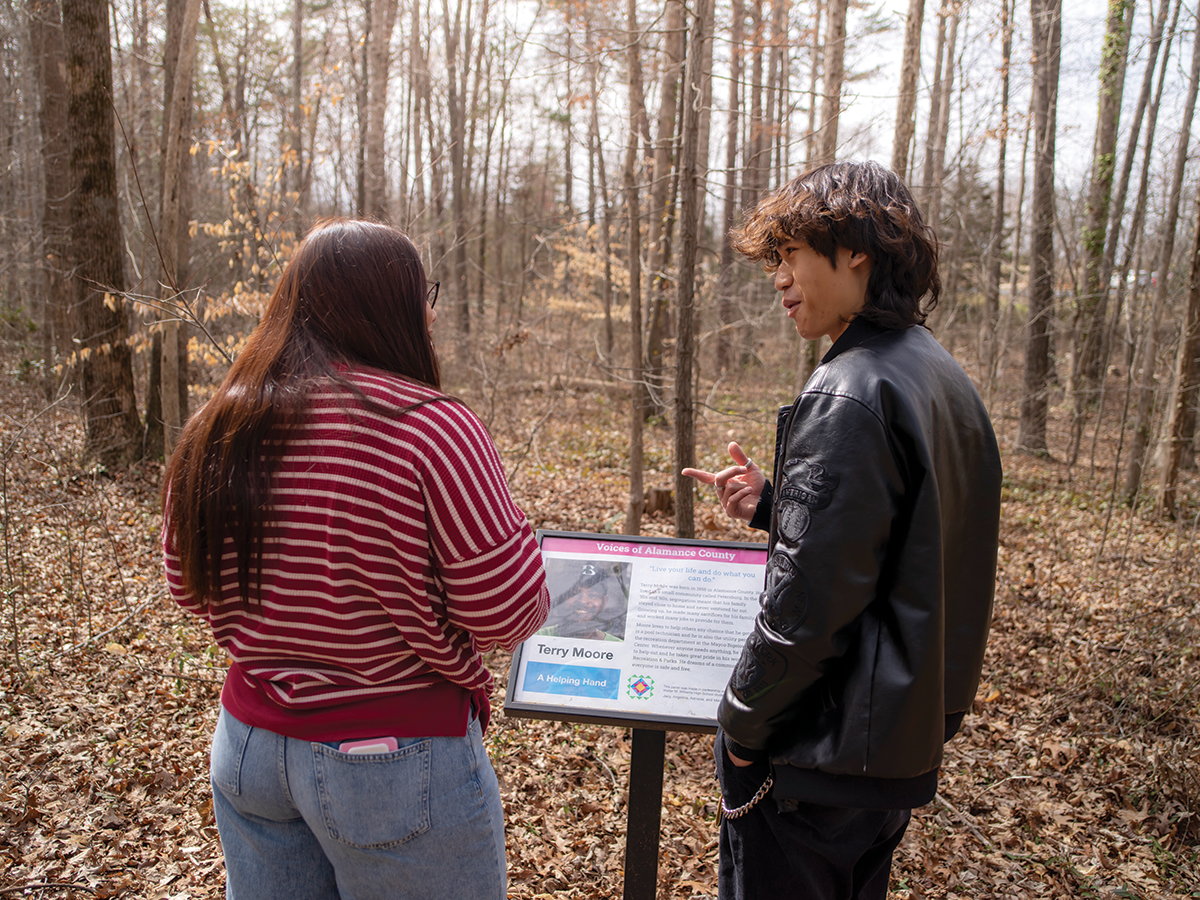
The oral histories are only one aspect of the Power + Place work. In 2024 the collaborative launched the Voices of Alamance County Public Story Walk, a physical representation of the digital stories. The first story walk was unveiled at Beth Schmidt Park after Elon students partnered with Williams High School students to formulate the stories. The story walks have now expanded to the Mayco Bigelow Community Center at North Park and the Graham Middle School walking trail. Stories of Alamance County faith leaders were also on display in the Numen Lumen Pavilion in fall 2024. The collaborative received a $10,000 Impact Alamance Community Forward Grant in 2023 to create dialogue across faith communities and to collect and share oral histories around religion and spirituality in Alamance County.
“We see the fall as being about capturing these oral histories, transcribing them and making them publicly accessible,” Lake says. “But we think about the rest of the year as trying to find opportunities to make that knowledge live, to connect those stories across generations, to bring them to schools, to bring them to parks, to bring them to residents, to host events, to have more conversations about what we’re learning when we listen more deeply to each other’s experiences.”
Because no one organization “owns” the collaborative, it can be hard to sustain financially. The organization has set up a gift fund so anyone can help the collaborative continue and grow.
“We’ve focused on stories of the past, but have created spaces in the present to raise issues that communities are facing,” Marshall says. “I hope that the next phase of this work could be a bit more targeted towards some of those issues that we’re hearing in the communities, that we could begin to address some of the continued inequities and we could continue to be a good neighbor to our surrounding community.”
Reflecting on how far the effort has come since Jane Sellars’ idea, Shields is thankful the work is continuing.
“When you look in the room when people come to screen our videos and see the faces of the community coming together in this way to share stories, that’s what she wanted to see,” Shields says. “It’s a beautiful thing and we are looking forward to many more stories in the future.”
Learn more and see the stories on the Power + Place Collaborative website.



